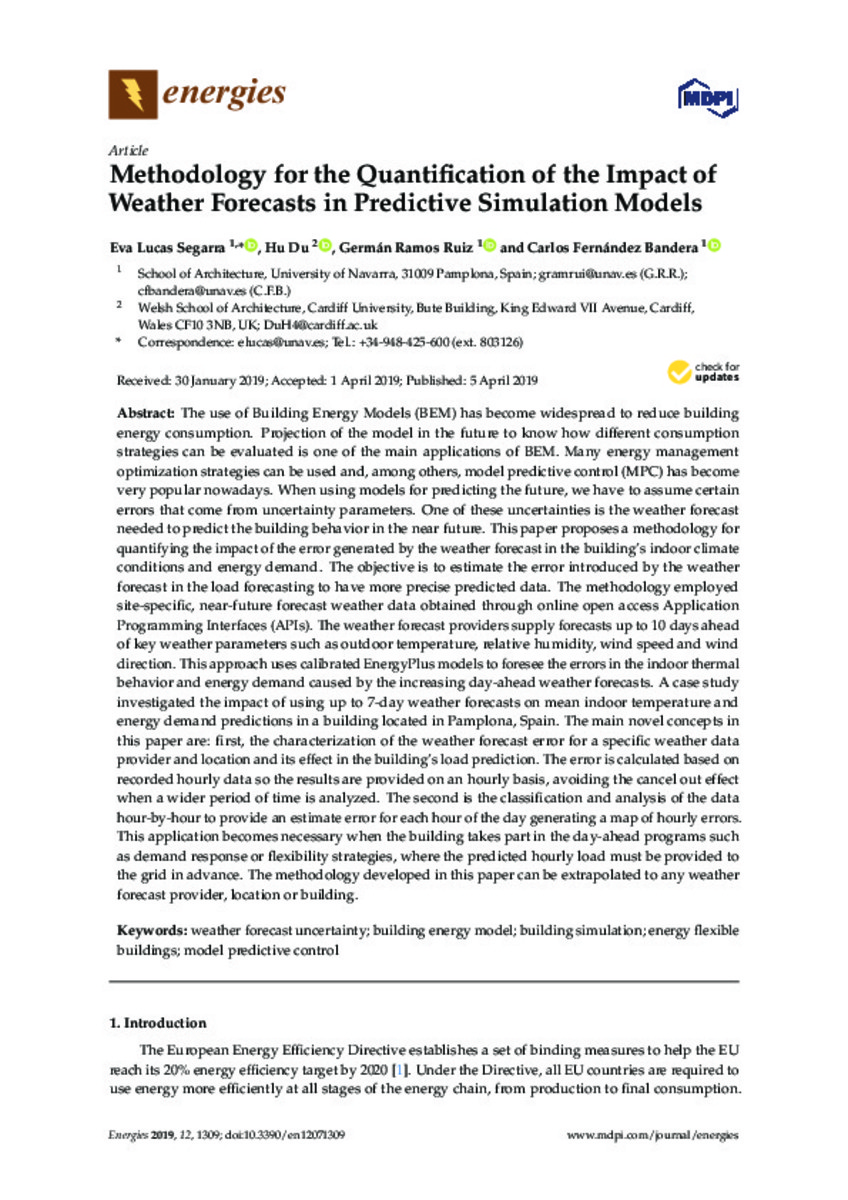Full metadata record
| DC Field | Value | Language |
|---|---|---|
| dc.creator | Lucas-Segarra, E. (Eva) | - |
| dc.creator | Du, H. (Hu) | - |
| dc.creator | Ramos-Ruiz, G. (Germán) | - |
| dc.creator | Fernández-Bandera, C. (Carlos) | - |
| dc.date.accessioned | 2019-05-06T15:32:31Z | - |
| dc.date.available | 2019-05-06T15:32:31Z | - |
| dc.date.issued | 2019 | - |
| dc.identifier.citation | Lucas-Segarra, E. (Eva); Du, H. (Hu); Ramos-Ruiz, G. (Germán); et al. "Methodology for the quantification of the impact of weather forecasts in predictive simulation models". Energies. 12(7) (1309), 2019, 1 - 16 | es |
| dc.identifier.issn | 1996-1073 | - |
| dc.identifier.uri | https://hdl.handle.net/10171/56815 | - |
| dc.description.abstract | The use of Building Energy Models (BEM) has become widespread to reduce building energy consumption. Projection of the model in the future to know how different consumption strategies can be evaluated is one of the main applications of BEM. Many energy management optimization strategies can be used and, among others, model predictive control (MPC) has become very popular nowadays. When using models for predicting the future, we have to assume certain errors that come from uncertainty parameters. One of these uncertainties is the weather forecast needed to predict the building behavior in the near future. This paper proposes a methodology for quantifying the impact of the error generated by the weather forecast in the building¿s indoor climate conditions and energy demand. The objective is to estimate the error introduced by the weather forecast in the load forecasting to have more precise predicted data. The methodology employed site-specific, near-future forecast weather data obtained through online open access Application Programming Interfaces (APIs). The weather forecast providers supply forecasts up to 10 days ahead of key weather parameters such as outdoor temperature, relative humidity, wind speed and wind direction. This approach uses calibrated EnergyPlus models to foresee the errors in the indoor thermal behavior and energy demand caused by the increasing day-ahead weather forecasts. A case study investigated the impact of using up to 7-day weather forecasts on... | - |
| dc.description.sponsorship | E.L.S, G.R.R. and C.F.B. work is funded by the research and innovation program Horizon 2020 of the European Union under the Grant No. 731211, project SABINA. H.D. work is supported by the Welsh Government’s Sêr Cymru (Stars Wales) program | - |
| dc.language.iso | en | - |
| dc.relation | info:eu-repo/grantAgreement/EC/H2020/731211/EU | - |
| dc.rights | info:eu-repo/semantics/openAccess | - |
| dc.subject | Weather forecast uncertainty | - |
| dc.subject | Building energy mode | - |
| dc.subject | Building simulation | - |
| dc.subject | Energy flexible buildings | - |
| dc.subject | Model predictive control | - |
| dc.title | Methodology for the quantification of the impact of weather forecasts in predictive simulation models | - |
| dc.type | info:eu-repo/semantics/article | - |
| dc.description.note | This is an open access article distributed under the Creative Commons: Atribution License (cc BY) | - |
| dc.identifier.doi | https://doi.org/10.3390/en12071309 | - |
| dadun.citation.publicationName | Energies | - |
Files in This Item:
Statistics and impact
Items in Dadun are protected by copyright, with all rights reserved, unless otherwise indicated.






